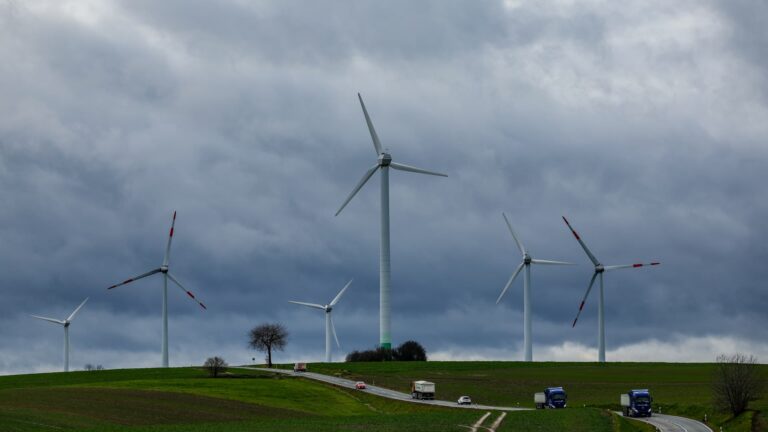Cars and trucks drive along a country road in stormy weather.
Jan Woitas | Picture Alliance | Getty Images
2024 was a strong year for aeolian energy in Germany, with permit awards for onshore wind turbines accelerating, according to industry data — but the upcoming Feb. 23 election means the sector now faces uncertainty, amid vocal skepticism from the two parties leading in the polls.
Friedrich Merz, the leader of the center-right Christian Democratic Union (CDU), which is polling in first place with around 30% of support alongside its affiliate party the CSU, has described wind power as a “transitional technology.” Speaking to public broadcaster ZDF late last year, he said he hoped “ugly” wind turbines could be dismantled eventually, “because they do not fit into the landscape.”
The far-right Alternative fuer Deutschland, which is second in national polls and expected to secure around 20% of votes, took the rhetoric even further. The party’s chancellor candidate Alice Weidel has threatened to tear down all wind turbines, which she reportedly labeled as “windmills of shame.” The AfD has called climate change into question and has frequently dismissed actions taken to tackle the environmental crisis.
Wind power, a form of renewable energy used to generate electricity, is considered important in the transition away from fossil fuels.
Wolf-Peter Schill, an energy economist at the German Institute for Economic Research (DIW Berlin), said some of the “wind power-bashing” during the election campaign has been “absurd” at times, particularly from the AfD.
“The AfD is, in many respects, a nightmare — also in terms of their wind power takes, but I think it is not super relevant as they will not be in power,” Schill told CNBC over video call.
Despite the AfD polling in second place, all other major parties in Germany have so far committed to not entering a coalition government with them, meaning they will likely form part of the opposition after the election.
“What the CDU, the conservative party, does is much more relevant, at least for the next government,” Schill noted.
Germany’s wind energy expansion
Schill cited a recent report from the German Wind Energy Association and engineering foundation VDMA Power Systems, which said the country achieved a historic milestone for onshore wind energy in 2024.
Europe’s largest economy licensed more than 2,400 onshore wind turbines last year, the report said, representing a combined capacity of more than 14 gigawatts. Contracts awarded for onshore wind turbines also rose to a record high, it added.
Dennis Rendschmidt, managing director of VDMA Power Systems, told CNBC that the record figures highlighted the effectiveness of legal changes and political measures implemented in recent years. They also signaled a new dynamic for the sector, he said.
“This momentum needs to be kept up by a new federal government,” Rendschmidt added, according to a CNBC translation of emailed comments. The expansion of wind energy must…
Read More: Wind energy had strong year in Germany but the election may shake things up



